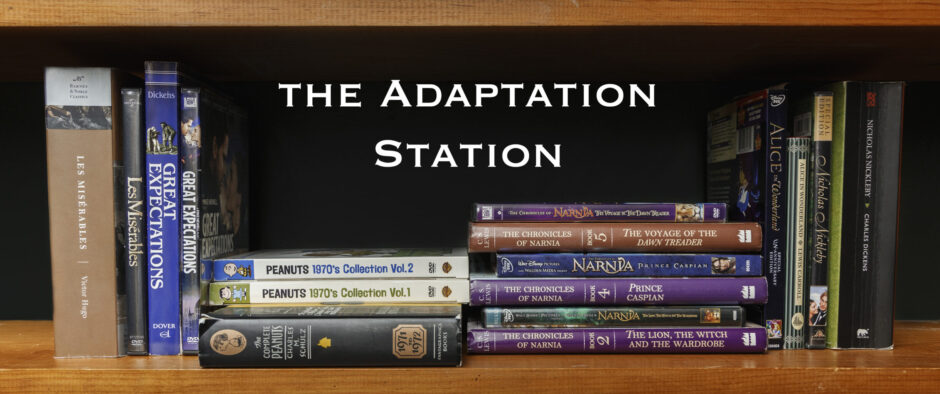“The great danger of lying is not that lies are untruths, and thus unreal, but that they become real in other people’s minds. They escape the liar’s grip like seeds let loose in the wind, sprouting a life of their own in the least expected places until one day the liar finds himself contemplating a lonely but nonetheless healthy tree, grown off the side of a barren cliff.”-Christine Leunens, Caging Skies.
There have been several dark, depressing and disturbing books that were adapted into much cheerier movies.[1]There have also been movie adaptations of books that did the opposite, but that doesn’t concern us right now. The novel Caging Skies by Christine Leunens and its loose cinematic adaptation, writer/director Taika Waititi’s Jojo Rabbit is a particular striking modern example.[2]For the record, Leunens approves of Jojo Rabbit, saying she’s “seen film adaptations so faithful to the book that they somehow ended up being unfaithful in essence.” Jojo Rabbit is a quirky movie and by quirky, I mean that it’s a movie about a young boy who has imaginary conversations with his personal idol, deals with peer pressure, a father’s absence and his first major crush, a movie that ends with the boy finally tying his own shoelaces to symbolize his new maturity and a goofy dance, all with colorful cinematography and a wacky sense of humor-but that boy begins the story as an ardent Nazi in the lates 40s and his idol/imaginary friend is Adolf Hitler! It’s not unheard of for comedic or otherwise lightweight pieces of entertainment to feature Nazis. Indiana Jones, Bedknobs and Broomsticks and Hogan’s Heroes come to mind. But the Nazis in them are villains, not protagonists, and the stories tend to steer clear of the Holocaust and antisemitism.[3]For the record, Hogan’s Heroes is about a POW camp, not a concentration camp-which is still outrageously tasteless but it’s hard for me to condemn the show while laughing with it so hard. … Continue reading Jojo Rabbit takes the perspective (initially at least) of a supporter of the Nazi party and plays Anti-Jewish sentiment for broad satire. Gradually, it’s tone becomes much closer to that of a typical award-bait movie about World War II, but the goofiness never disappears for long.
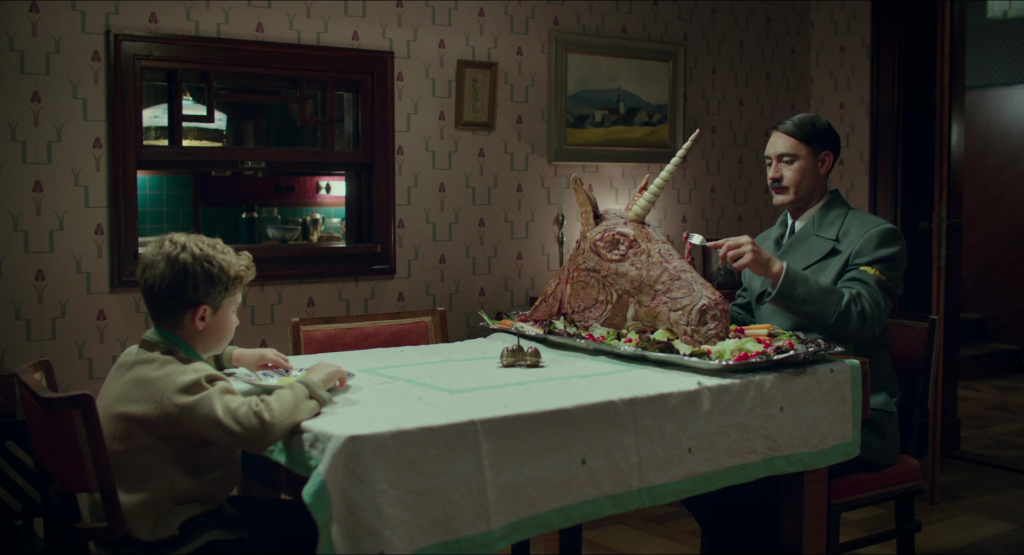
I don’t blame anyone for finding all this tasteless, but there’s also something to be said for the approach Jojo Rabbit takes. After all, the young boys growing up in Nazi Germany and imbibing jingoism and bigotry were normal boys dealing with things like peer pressure and crushes. They didn’t see themselves as tragic or rather, when the Third Reich fell, they did but it was as tragic heroes, not tragic villains. It’s worthwhile being reminded that they weren’t so different from us as we would like to think. And the element of surprise that Jojo Rabbit‘s edgy comedy carries arguably enables its message to get past viewers’ defenses in a way that, say, The Boy in the Striped Pyjamas can’t.
Caging Skies isn’t without a sense of humor, though I wouldn’t describe it as wacky. Technically, it’s a sense of irony as young Johannes Betzler is devastated that his parents don’t believe in Aryan-superiority. Our first real inkling of the vast difference between the book and the film doesn’t have to do with the tone. It’s an early scene where Johannes (Roman Griffin Davis) or Jojo as the movie call him, as part of a Hitler Youth exercise, has to kill a cute animal with his bare hands. In Caging Skies, it’s a duck or rather a pen of ducks and in Jojo Rabbit, it’s a rabbit hence the movie’s title.[4]I guess Waititi just felt Jojo Duckling didn’t sound catchy. I think it could have worked. Johannes doesn’t enjoy killing the ducks, but he grits his teeth and does it. Jojo, on the other hand, can’t bring himself to snap the rabbit’s neck and makes a futile effort to help it escape, earning him the scorn of the other Hitler Youth, and sadly disgracing himself in his own eyes. Thus, while both Johannes and Jojo are established as victims of a cruel culture, Johannes also shows more potential to be a villain.
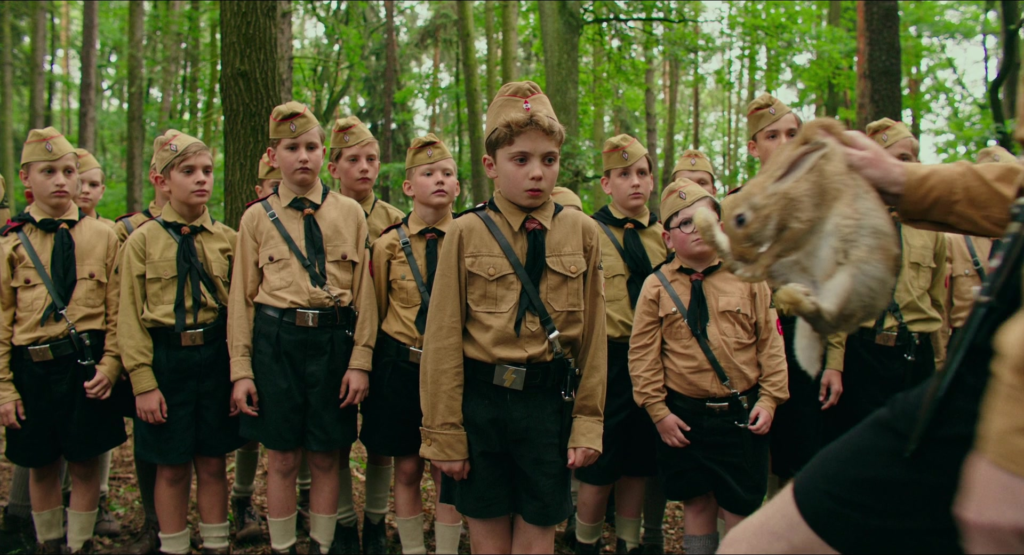
I’m going to have to give a broad summary of both Caging Skies and Jojo Rabbit here, so those who don’t want either spoiled should bypass reading this post. For what it’s worth, I’m going to be spoiling much more of Jojo Rabbit since it ends halfway through the plot of Caging Skies. Also, for what it’s worth, my summary will be broad, and the details are a large part of what make both the book and the movie memorable, so reading/watching them, even having read this post, is hardly a waste of time.
Accidents keep Johannes and Jojo at home and away from serving the Riech as they wish. One day they are horrified to discover Elsa Korr (Thomasin McKenzie), a Jewish girl, hidden away in their house. She’s an old friend of Johannes’s deceased older sister[5]Her name is Ute in Caging Skies, Inga in Jojo Rabbit. and his parents are harboring her from the Nazis. The movie’s Elsa easily gets the better of Jojo and threatens to get his family in trouble if he reports her. The book’s Elsa puts up no resistance to Johannes even when he looks like he’s about to kill her, believing that would be the most practical solution to his problem. What stays his hand isn’t so much loyalty to his parents, whom he claims aren’t nearly as important to him as the Fuhrer though that may just be bravado, as it is physical attraction to Elsa.
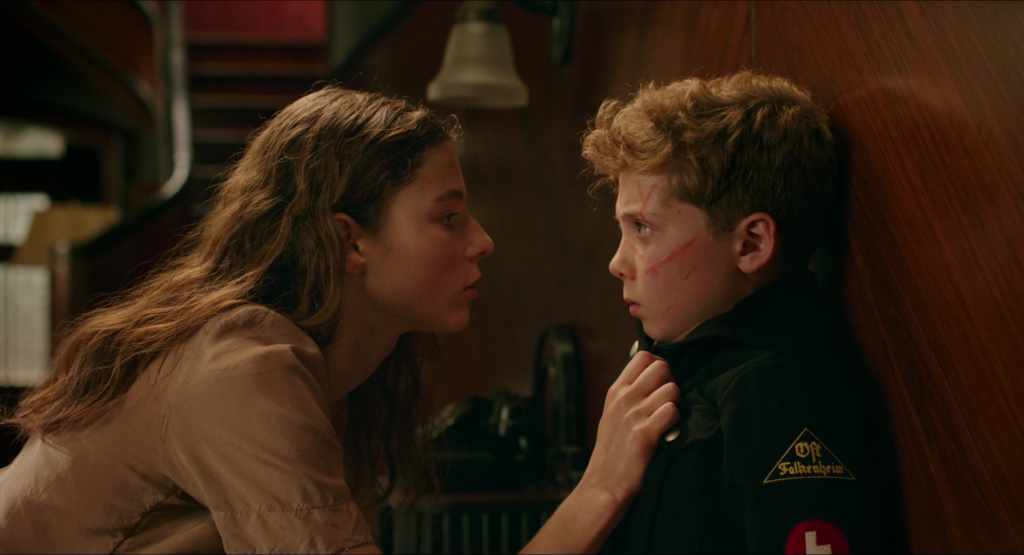
The movie gives us a best-case scenario with Jojo and Elsa becoming friends and him gradually abandoning his belief in Aryan superiority, symbolized by him finally expelling his imaginary friend, Hitler (Waititi himself) from his house. While a bond certainly forms between the two in the book, it’s far, far darker and more disturbing with Johannes using her fear and guilt at endangering his family to manipulating her into becoming his lover. (It’s important to keep in mind that in the book, Johannes is a teenager at this point. Caging Skies follows his life from early childhood to adulthood. In Jojo Rabbit, we just see his equivalent go from ten to ten and a half.) The film retains Jojo’s jealousy of Elsa’s (unseen) boyfriend, Nathan, but it’s played much more for laughs, though it still ends up fulfilling a dramatic function. In the book, Johannes resents her love for him when “she had a superior Aryan right in front of her eyes.” Both Johannes and Jojo eventually become disillusioned with Hitler after hearing of his disgraceful death and other shameful secrets, but Johannes never completely loses his antisemitism. According to him:
“Somehow, whatever one learns as a child in school leaves behind a solid core; and it’s impossible to replace this core within oneself; one can only grow on from there. One’s beliefs through life resemble the rings of a tree, each year solidifying what we successively thought, doubted and believed. Nature takes no note of the contradictory ideas, all of which are packed in, one after another to make the trunk we are: the compact unified remainder of our diametric past.”
Both Caging Skies and Jojo Rabbit have a scene where Elsa lists famous and well-regarded Jewish people to a skeptical Johannes but suffice to say that the two conversations have two very different tones.
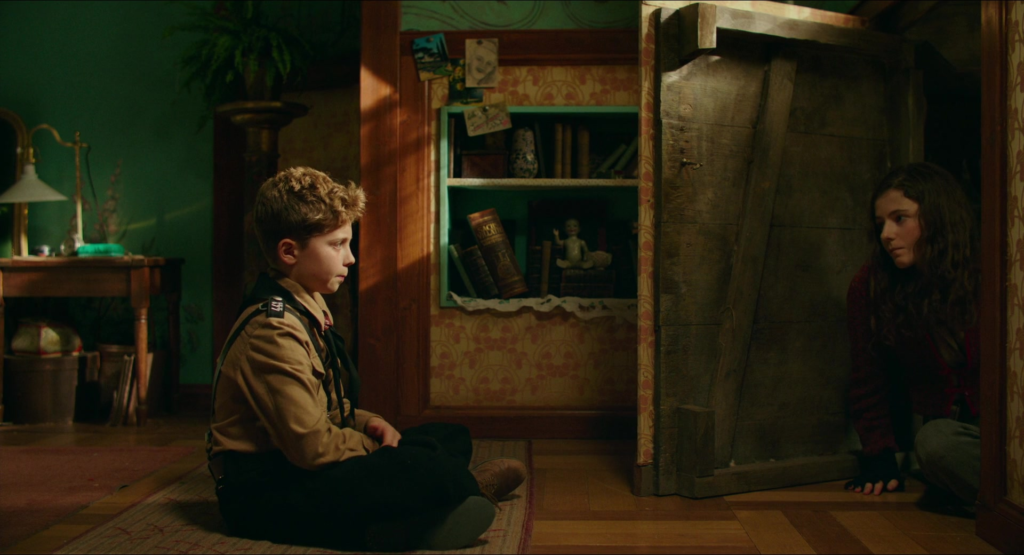
Jojo’s mother (Scarlett Johansson) is also a more positive character in the movie. Not that her Caging Skies equivalent is as bad as her son, but she grows to resent having to take care of Elsa at great risk to her own family and ends up neglecting her to the point that she has to be rescued by Johannes. The mother in Jojo Rabbit, says, at one point, that she doesn’t know what she’ll do if she has to choose between Elsa and her son, but she proves to be a good, nurturing maternal presence in both their lives.

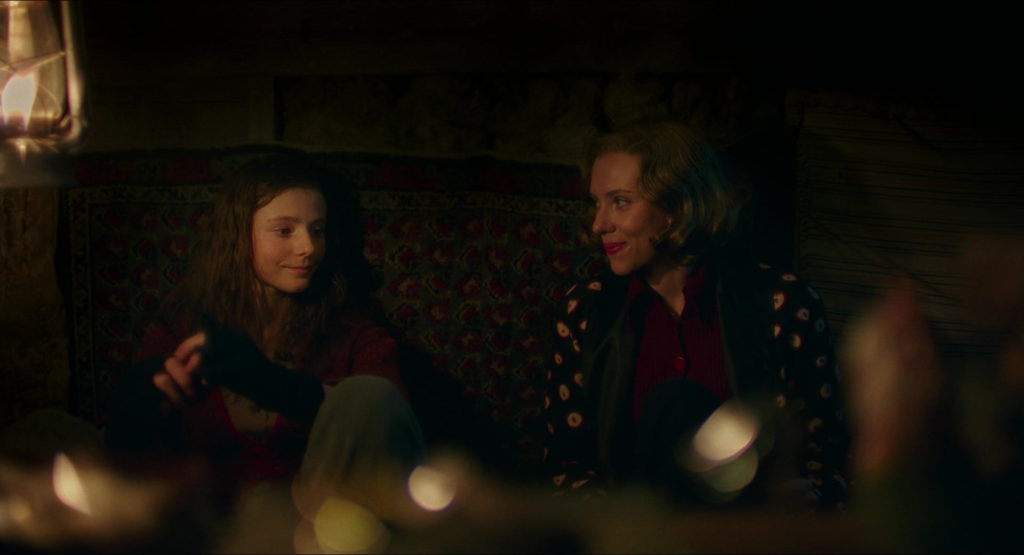
Now we get to the real spoilers, so this is the last chance to bail out.
By the time the war is over and Jewish people can come out of hiding, Johannes is the only one alive taking care of Elsa. On a whim, he tells her that the Germans have won, keeping her effectively his prisoner. Later, he lets her have information about the Holocaust but not the fact that the people responsible for the atrocities are facing justice. Again, this is roughly halfway through Caging Skies. There’s plenty more to come in the novel and it isn’t pretty. Jarringly, after Jojo Rabbit has devoted so much time to rehabilitating Jojo, and even wanted us to see him as basically innocent while he was still in full Nazi mode, it has him to do the same thing, only to have him repent in practically the same scene and show Elsa that she’s free, ending the movie. We don’t get any idea how Jojo and Elsa are going to do now that they’ve lost their parents and their country is occupied. The book goes into great detail about that.
I’m cynical about the way Jojo Rabbit scapegoats Hitler, implying that everybody pretty much got over their antisemitism once he’d died.[6]I do think it’s fair to say the Holocaust made antisemitism relatively less popular. Not only does Jojo get over his prejudice, but so does his friend, Yorki (Archie Yates), without the bother of a transformative relationship and there’s an authority figure, besides Jojo’s mother, whose antisemitism is all but stated to have been an act. Caging Skies, by contrast, knows that evil didn’t begin and end with Adolf Hitler and the Nazi party. Even if Johannes were to get over his racism, which it’s doubtful he ever does, he would still have plenty of terrible vices.
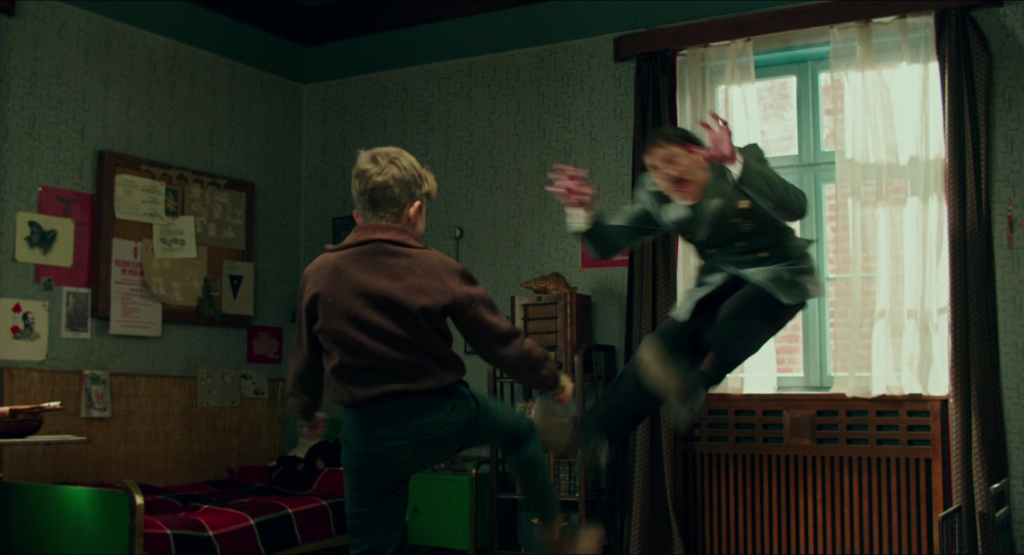
That being said, I can’t bring myself to denounce Jojo Rabbit or say I’d rather watch a more accurate adaptation of the source material. I enjoy the character of Elsa Kor much more in Jojo. Her response to being told that Jews are weak compared to Aryans is pretty awesome.
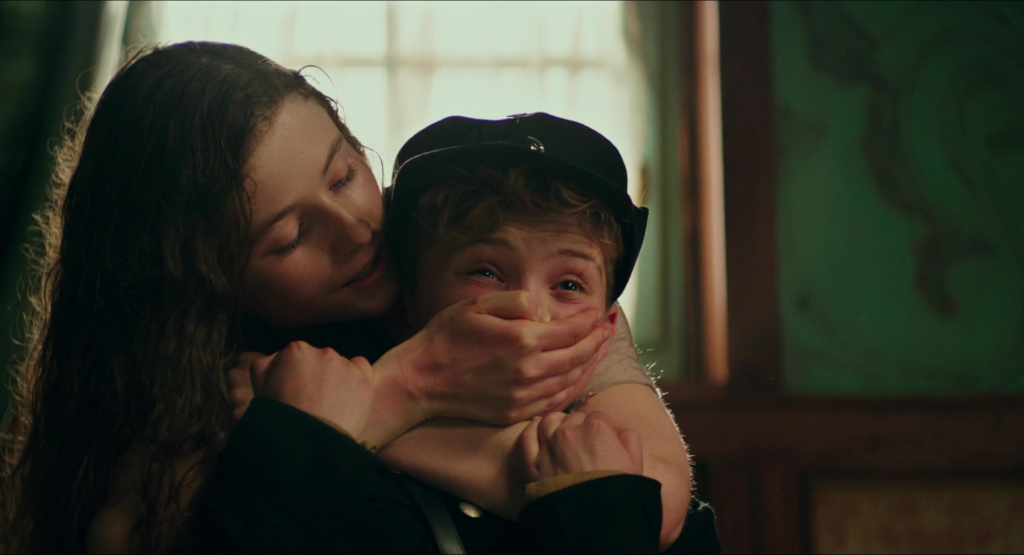
Of course, there’s a very strong case to made that the character of a Jewish girl trying to evade the Holocaust should not be one that could be described as fun or enjoyable, bringing us back to the question of whether or not Jojo Rabbit is in good taste.
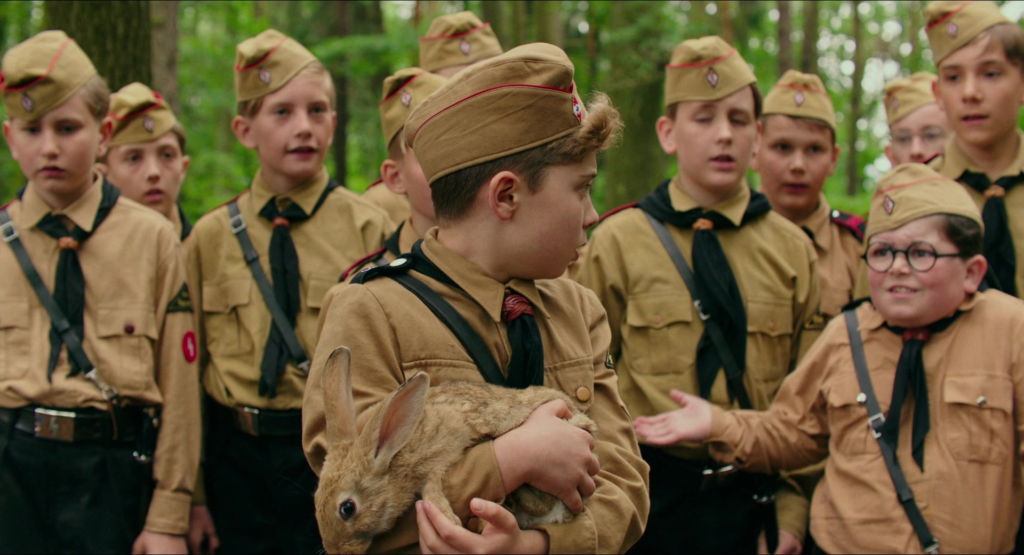
I don’t know. You’ll have to come to your own conclusions.
Bibliography
Leunens, Christine. (2010) Caging Skies. New York: Random House Inc.
jojo-rabbit-final-script.pdf (deadline.com)
References
| ↑1 | There have also been movie adaptations of books that did the opposite, but that doesn’t concern us right now. |
|---|---|
| ↑2 | For the record, Leunens approves of Jojo Rabbit, saying she’s “seen film adaptations so faithful to the book that they somehow ended up being unfaithful in essence.” |
| ↑3 | For the record, Hogan’s Heroes is about a POW camp, not a concentration camp-which is still outrageously tasteless but it’s hard for me to condemn the show while laughing with it so hard. An uplifting comedy that actually does prominently feature a Nazi concentration camp is Roberto Benigni’s Life Is Beautiful. It’d be interesting to compare Jojo Rabbit to that film, but I haven’t seen it and it’s not an adaptation. |
| ↑4 | I guess Waititi just felt Jojo Duckling didn’t sound catchy. I think it could have worked. |
| ↑5 | Her name is Ute in Caging Skies, Inga in Jojo Rabbit. |
| ↑6 | I do think it’s fair to say the Holocaust made antisemitism relatively less popular. |
